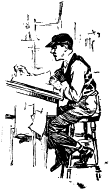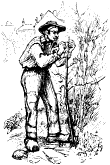Search us!
Search The Word Detective and our family of websites:
This is the easiest way to find a column on a particular word or phrase.
To search for a specific phrase, put it between quotation marks. (note: JavaScript must be turned on in your browser to view results.)
Ask a Question! Puzzled by Posh?
Confounded by Cattycorner?
Baffled by Balderdash?
Flummoxed by Flabbergast?
Perplexed by Pandemonium?
Nonplussed by... Nonplussed?
Annoyed by Alliteration?

Don't be shy!
Send in your question!
Columns from 1995 to 2006 are slowly being added to the above archives. For the moment, they can best be found by using the Search box at the top of this column.
 If you would like to be notified when each monthly update is posted here, sign up for our free email notification list.
If you would like to be notified when each monthly update is posted here, sign up for our free email notification list.
Trivia
All contents herein (except the illustrations, which are in the public domain) are Copyright © 1995-2020 Evan Morris & Kathy Wollard. Reproduction without written permission is prohibited, with the exception that teachers in public schools may duplicate and distribute the material here for classroom use.
Any typos found are yours to keep.
And remember, kids,
Semper Ubi Sub Ubi
|
None for me, thanks.
Dear Word Detective: What is the origin and current use of the word “scribner”? A Canadian coworker says the Canadians use this word like we do “scribe” although it has an expanded meaning of not only taking notes, but watchdogging all paperwork for a project or committee. Do you concur? Was it originally British? — Kathleen.
Hey, this is cool. I finally get to try out my Canadian dictionary. Seriously. I’ve had The Canadian Oxford Dictionary (“The foremost authority on Canadian English”), all 1700 pages of it, sitting on my shelf for almost ten years, where it has collected a formidable layer of dust. I can’t really claim any foresight on this score, however, because Oxford University Press sends me pretty much every dictionary they publish, which may explain why the floor of my office tilts so alarmingly.
Hmm, the book seems to be stuck to the shelf. I must have a word with the housekeeper as soon as I hire one. Here we go, “Scriabin,” “scribbler,” “scribe,” “scrim.” Oops, no “scribner.” Let’s give Google a shot. Nope, lots of references to Charles Scribner’s Sons, the famed American publisher, as well as “Scribner” as a common surname, but no “scribner” in the sense you mention. The Oxford English Dictionary also comes up blank.
 It’s certainly possible that your Canadian friend is correct about “scribner” being used as described, but at this point I’m wondering if he or she might have misheard the word “scrivener” as “scribner.” A “scrivener” originally was (the profession being long obsolete) a copyist, a clerk who copied legal documents in longhand before the widespread advent of printing. The most famous (and disturbing) example of this breed is no doubt Bartleby the Scrivener, the subject of of Herman Melville’s short story, whose catch-phrase “I would prefer not to” has resonated with office workers since the story’s publication in 1853. Incidentally, there has been a case made that what ailed Bartleby was Asperger’s syndrome, a form of autism. It’s certainly possible that your Canadian friend is correct about “scribner” being used as described, but at this point I’m wondering if he or she might have misheard the word “scrivener” as “scribner.” A “scrivener” originally was (the profession being long obsolete) a copyist, a clerk who copied legal documents in longhand before the widespread advent of printing. The most famous (and disturbing) example of this breed is no doubt Bartleby the Scrivener, the subject of of Herman Melville’s short story, whose catch-phrase “I would prefer not to” has resonated with office workers since the story’s publication in 1853. Incidentally, there has been a case made that what ailed Bartleby was Asperger’s syndrome, a form of autism.
In modern use, “scrivener” (from the Old French “escrivain,” a notary or clerk,” based on the Latin “scribere,” to write,” also the source of “scribe”) is used to mean a clerk, assistant, or “amanuensis,” a lovely word originally meaning “one who takes dictation by hand” (from the Latin “servus a manu,” literally “servant from the hand”). It seems plausible that “scrivener” could be used to mean “someone in charge of the paperwork,” and, given that the word is not commonly heard, the substitution of the simpler form “scribner” seems almost inevitable.
“Amanuensis,” by the way, has also taken on the broader sense of “literary assistant,” especially to a writer. My father, who as a young man worked as a personal assistant for the journalist, essayist and lexicographer H.L. Mencken, took great pride in being introduced by Mencken as “my amanuensis.”
The word known to all men.
Dear Word Detective: Today my son was reading and asked me if “moolah” was a French word. I was pretty sure it wasn’t, said so, and then scurried off in search of etymology on the internet, as is my wont. Imagine my surprise to find it listed as “Origin Unknown” by all respected authorities and, even more incredible, no investigation done by the esteemed Word Detective! Time to put on that fedora and hit the streets, gumshoe! Seriously, though, I know that if all the major dictionaries are saying it’s “Origin Unknown,” that means just what it says: nobody has a real answer yet. But perhaps you could fill us in on the leading theories on “moolah”? — Kyle Riff.
 Oh, ye of little faith! Of course I’ve researched “moolah.” And researched, and researched, poring over both hefty volumes of etymological wisdom and websites of flamboyant flapdoodle. I have researched until my fingers are cramped and my eyes are crossed, yet the journey always ends with me making another cup of coffee and picking a different question to answer. But people keep asking about “moolah,” so I guess you folks deserve at least a progress report. Oh, ye of little faith! Of course I’ve researched “moolah.” And researched, and researched, poring over both hefty volumes of etymological wisdom and websites of flamboyant flapdoodle. I have researched until my fingers are cramped and my eyes are crossed, yet the journey always ends with me making another cup of coffee and picking a different question to answer. But people keep asking about “moolah,” so I guess you folks deserve at least a progress report.
What makes this quest especially frustrating is that “moolah” is one of my favorite words. As a vernacular synonym for “money” since the late 1930s, “moolah” has the swing and swagger of great slang and instantly brands its user as way too cool to sweat the small change of life.
One would think, with so many people wondering about the roots of “moolah,” that someone would have come up with at least one entertaining “urban legend” about the word, but no such luck. What theories do exist about its origins are both terse and far-fetched. One holds that “moolah” derives from the French “le moulin,” meaning “the mill,” referring to factory mills as a source of wealth. Color me extremely unconvinced. But while we’re stretching plausibility to the breaking point, I must mention the recent announcement, by the Times of India newspaper, that “moolah” is the Fijian (as in Fiji, in the South Pacific) word for “money.” Unfortunately, I lent my Fijian dictionary to my accountant last week, so I’ll have to wait until he gets back to check this assertion. But unless someone can explain how a Fijian word ended up on the lips of US gamblers and hipsters in the 1930s, I plan to ignore that theory. Yet another theory traces “moolah” to the Romany (Gypsy) word “mol,” meaning “to be worth,” which is not impossible but is considered unlikely by linguists.
Another theory, proposed by Daniel Cassidy in his recent book “The Secret Language of the Crossroads: How the Irish Invented Slang,” traces “moolah” to the Irish phrase “moll oir,” meaning “pile of gold.” My inclination is to consider this quite plausible, but Mr. Cassidy apparently paints with a very broad brush, also tracing “buckaroo” to the Irish “bocai rua” (wild boys). It has long been generally accepted, on solid evidence, that “buckaroo” is actually derived from the Mexican Spanish “vaquero,” meaning “cowboy.”
That doesn’t, of course, mean that Mr. Cassidy is wrong about “moll oir,” and personally I like his theory. But the quest must continue.
Farm faster, Dwayne.
Dear Word Detective: I’m a more recent reader of your work (I noticed recently that someone had been reading for seven years!), and have enjoyed it. I came cross “agflation” in the Economist last week, and I was curious to see this word. Has this been used before? — Dibyo, Bangalore, India.
 Seven years, eh? Well, we all work at our own pace. It used to take me forever to eat my vegetables as a child. In fact, I still have some eggplant from 1961 around here somewhere. The good news is that as long as I keep writing faster than that reader reads, the universe won’t collapse. Can someone bring me another cup of coffee? Seven years, eh? Well, we all work at our own pace. It used to take me forever to eat my vegetables as a child. In fact, I still have some eggplant from 1961 around here somewhere. The good news is that as long as I keep writing faster than that reader reads, the universe won’t collapse. Can someone bring me another cup of coffee?
I’m not sure it’s the article to which you refer, but I have found a piece in the Economist from last summer that explains “agflation” in simple terms: “Aside from wheat [which has hit a new high], the prices of corn, rice and barley have all risen by over a third since 2005. Food prices around the world are rising so quickly that a new term has been coined to describe the ballooning price of breakfast staples and dinner-time favorites: agflation.” The problem seems due, at least in part, to a rush to grow corn to get government ethanol subsidies, making both corn and every other grain (of which there is now less being grown) more expensive. Combine that with bad weather in Canada (which is apparently one huge corn farm), and a box of Pop-Tarts will soon require one of those “payday” loans.
“Agflation” appears to be a genuinely new word. The earliest press citation I can find for it is only a few months old, from May 6, 2007, also from the Economist, in an article titled, oddly, “Nuns Mug Orphan.” (The Economist is known for inventive headlines. They reported President Reagan’s intestinal growth scare back in the 1980s under the headline “A Polyp Case Now.”) The writers credit the invention of the term “agflation” to the brokerage and investment firm Merrill Lynch, which issued a report titled “Global Agriculture and Inflation” on April 27, 2007.
The genesis of “agflation” is obviously a combination of “agriculture” and “inflation,” although it seems to be being used to mean both the rise in price of agricultural goods themselves and the rise in prices of other goods and services driven by rising food prices.
I don’t pretend to understand economics, but “inflation,” in practical couch-potato terms, means that both couches and potatoes become more expensive. It is the job of economists (who do pretend to understand such things) to coin clever terms to describe the particular flavor of discomfort that consumers are suffering at any given moment. The “flation” of “inflation” lends itself to such inventions, and those old enough may remember the “stagflation” (a blend of “stagnation” and “inflation”) that tormented the US economy in the 1970s. It’s been nearly forty years and I still don’t understand “stagflation,” so I don’t plan to dwell on “agflation” too much. But I am going to plant corn on the front lawn next year.
|
Makes a great gift! Click cover for more.  
400+ pages of science questions answered and explained for kids -- and adults!
FROM ALTOIDS TO ZIMA, by Evan Morris
 
|
 It’s certainly possible that your Canadian friend is correct about “scribner” being used as described, but at this point I’m wondering if he or she might have misheard the word “scrivener” as “scribner.” A “scrivener” originally was (the profession being long obsolete) a copyist, a clerk who copied legal documents in longhand before the widespread advent of printing. The most famous (and disturbing) example of this breed is no doubt Bartleby the Scrivener, the subject of of Herman Melville’s short story, whose catch-phrase “I would prefer not to” has resonated with office workers since the story’s publication in 1853. Incidentally, there has been a case made that what ailed Bartleby was Asperger’s syndrome, a form of autism.
It’s certainly possible that your Canadian friend is correct about “scribner” being used as described, but at this point I’m wondering if he or she might have misheard the word “scrivener” as “scribner.” A “scrivener” originally was (the profession being long obsolete) a copyist, a clerk who copied legal documents in longhand before the widespread advent of printing. The most famous (and disturbing) example of this breed is no doubt Bartleby the Scrivener, the subject of of Herman Melville’s short story, whose catch-phrase “I would prefer not to” has resonated with office workers since the story’s publication in 1853. Incidentally, there has been a case made that what ailed Bartleby was Asperger’s syndrome, a form of autism.

 can be found
can be found 
 Oh, ye of little faith! Of course I’ve researched “moolah.” And researched, and researched, poring over both hefty volumes of etymological wisdom and websites of flamboyant flapdoodle. I have researched until my fingers are cramped and my eyes are crossed, yet the journey always ends with me making another cup of coffee and picking a different question to answer. But people keep asking about “moolah,” so I guess you folks deserve at least a progress report.
Oh, ye of little faith! Of course I’ve researched “moolah.” And researched, and researched, poring over both hefty volumes of etymological wisdom and websites of flamboyant flapdoodle. I have researched until my fingers are cramped and my eyes are crossed, yet the journey always ends with me making another cup of coffee and picking a different question to answer. But people keep asking about “moolah,” so I guess you folks deserve at least a progress report. Seven years, eh? Well, we all work at our own pace. It used to take me forever to eat my vegetables as a child. In fact, I still have some eggplant from 1961 around here somewhere. The good news is that as long as I keep writing faster than that reader reads, the universe won’t collapse. Can someone bring me another cup of coffee?
Seven years, eh? Well, we all work at our own pace. It used to take me forever to eat my vegetables as a child. In fact, I still have some eggplant from 1961 around here somewhere. The good news is that as long as I keep writing faster than that reader reads, the universe won’t collapse. Can someone bring me another cup of coffee?



Recent Comments